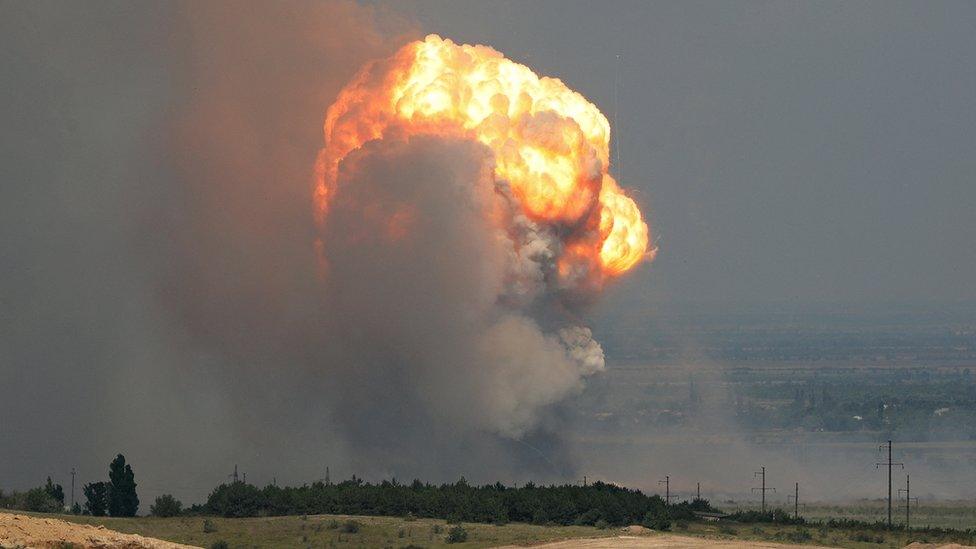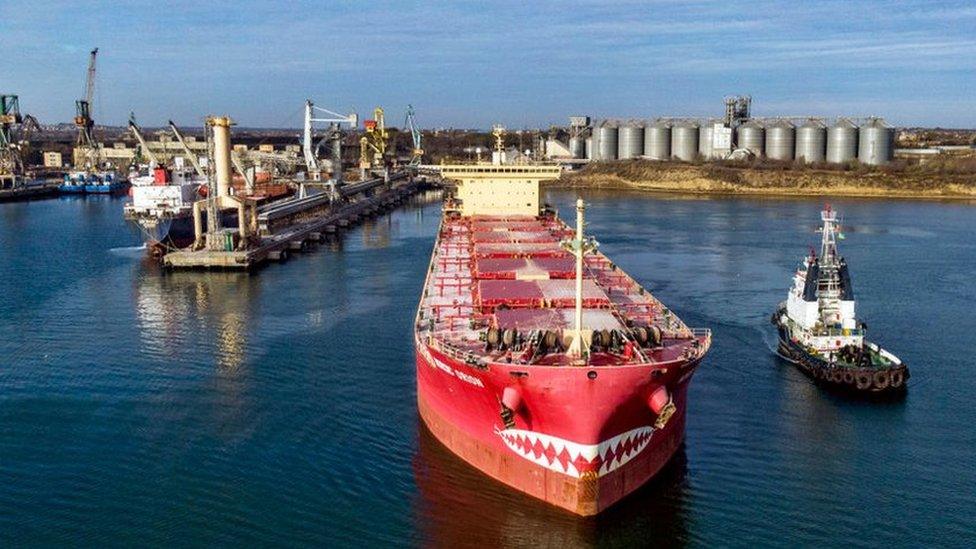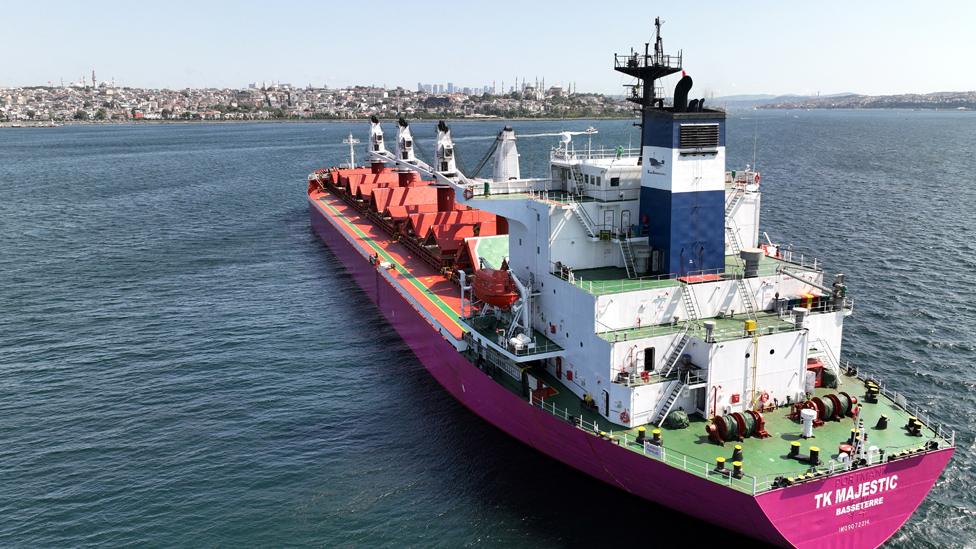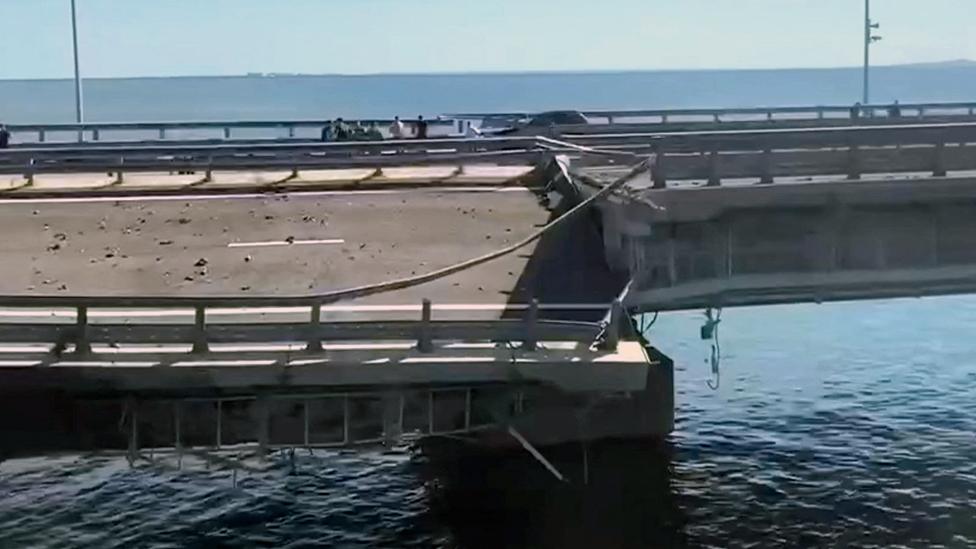Ukraine war: Russia strikes Ukraine grain after ending sea deal
- Published
- comments
Watch: Footage shows the impact of attack on Odesa grain terminals
Russian missile attacks on Ukraine's Black Sea coast have destroyed 60,000 tonnes of grain and damaged storage infrastructure, officials say.
Agriculture Minister Mykola Solskyi said a "considerable amount" of export infrastructure was out of operation.
Russia has pulled out of a deal guaranteeing safe passage for exports across the Black Sea.
Later on Wednesday Russia's President Putin accused the West of using the grain deal as "political blackmail".
He added he would consider rejoining the international agreement, in place since last summer, only "if all principles under which Russia agreed to participate in the deal are fully taken into account and fulfilled".
His comments came shortly after Russia's defence ministry declared that from midnight on Wednesday night (21:00 GMT), any ships heading to Ukrainian ports would be viewed as potential carriers of military cargo and party to the conflict.
Some north-western and south-eastern areas of the Black Sea would be temporarily dangerous for shipping, it added.
Russia began targeting Ukraine's ports in the early hours of Tuesday within hours of its withdrawal from the grain deal.
More strikes followed overnight into Wednesday, targeting grain terminals and port infrastructure in Odesa and further down the Black Sea coast in Chornomorsk, two of the three ports that were included in the export deal.
At least 12 civilians, including a nine-year-old boy, were wounded during the attacks, which also caused damage to blocks of flats, military officials said.
Ukrainian President Volodymyr Zelensky said each missile strike was a blow not just to Ukraine, but to "everyone in the world striving for a normal and safe life".
France and Germany also condemned the attack. Germany Foreign Minister Annalena Baerbock said that by covering Odesa with a hail of bombs, Russian President Vladimir Putin was robbing the world of any hope of Ukrainian grain and "hitting the world's poorest".
The infrastructure ministry published a series of photos, external showing damage to silos and other grain facilities. Officials said there had been damage to wharves and reservoirs, but it was international and Ukrainian traders that had suffered the most.
Russian war commentators said the damage proved that Kyiv was unable to shoot down the majority of Russian missiles and drones.
Officials said the co-ordinated attack involved Kalibr cruise missiles, Onyx supersonic and Kh-22 anti-ship missiles as well as kamikaze drones, fired from the Black Sea, Crimea and southern Russia. Although 37 Russian missiles and drones were shot down, a number did penetrate Ukrainian defences, they said.
Russia had called its initial attack on Odesa a "mass revenge strike" for an attack on the Russian-built bridge over the Kerch strait linking occupied Crimea to Russia.
Seaborne drones were blamed for Monday's bridge strike that knocked out a section of bridge and killed a Russian couple.

Explosions were reported for several hours from the ammunition depot in Crimea
Crimea saw further disruption on Wednesday. Some 2,200 residents were evacuated from four villages near a military training range after a fire triggered hours of explosions at a nearby ammunition depot.
Russian-installed officials also shut a 12-km (7.5-mile) section of the Tavrida motorway that links the cities of Simferopol and Sevastopol in southern Crimea to the bridge over the Kerch strait. Construction of the road by Russia's occupation authorities began in 2017.
A series of explosions were heard in the area from about 04:30 (01:30 GMT) on Wednesday.
Officials did not explain the cause of the fire near the city of Staryi Krim. But unconfirmed reports on social media spoke of three Ukrainian strikes.
Russia's appointee boss in Crimea, Sergei Aksyonov, said the cause of the fire at the military range was being investigated, but that no-one was hurt.

Related topics
- Published2 April 2024

- Published18 July 2023

- Published18 July 2023

- Published18 July 2023
